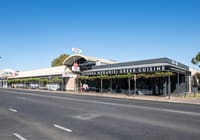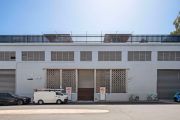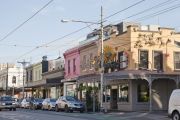
Tim Gurner, Qualitas take control of Jam Factory after $180m raising
Rich Lister Tim Gurner and ASX-listed financier Qualitas have taken full ownership of the famous Jam Factory site on Melbourne’s Chapel Street after buying out fund manager Newmark Capital’s 65 per cent share for about $125 million.
The deal, which follows the Gurner-Qualitas partnership buying a 35 per cent stake in the project in 2021 for about $75 million, ends Newmark’s near nine-year interest in the two-hectare heritage site.
Gurner-Qualitas has raised $180 million to fund the land purchase and development of the site.

The long-mooted redevelopment of the distinctive red-brick mall is considered key to Chapel Street reclaiming its mantle as one of Melbourne’s top shopping and dining strips.
However, numerous proposals have come and gone, including controversial plans in 2008 by then-owner Challenger to demolish the 166-year-old building and replace it with a much bigger mall and plans by Newmark Capital in 2017 for an office-focused redevelopment.
The revised Gurner-Qualitas plans for the Jam Factory include 15,000 square metres of commercial office space, more 20,000 square metres of retail, a new Village Cinemas complex, two hotels and four residential towers, with a combined end value of $2.75 billion.
“With this transaction now finalised we can turn our attention to fast-tracking construction and making this city-shaping redevelopment happen,” Mr Gurner said.
“There is no other site like this in Melbourne.”

Decade of plans
Earlier plans to redevelop the Jam Factory site began to take shape in 2015, after Newmark Capital, led by former Hawthorn football star Chris Langford and co-founder Simon Morris, paid Challenger $165 million for the faded mall.
Three years later, Newmark secured approval from the City of Stonnington for a 100,000-square-metre mixed-use precinct, of which about half would comprise office space.
However, the project stalled as Chapel Street’s retail star faded, forcing a revamp of the scheme in 2021 that reduced the office component and introduced a hotel and four residential towers under the new co-ownership structure with Mr Gurner and Qualitas.
Newmark’s stake in the Jam Factory was held in an unlisted property trust. Mr Langford said the sale of its remaining half-share in the Jam Factory delivered certainty for the trust’s investors in an “unpredictable market”.

For Gurner and Qualitas, also partners on a build-to-rent development fund that has raised $3.2 billion, taking full control of the Jam Factory site will allow them to deliver the mixed-use precinct in independent stages, mitigating construction risk.
Stage one of the project – of which the JV partners hope to commence construction at the start of next year (it hopes to secure a permit from the City of Stonnington “within months”) – will include 250 luxury apartments and a retail component, with an end value of about $350 million.
Apartments will be priced from $750,000 up to more than $30 million for penthouses, which Mr Gurner said would take their inspiration from luxury projects like Saint Moritz at St Kilda.
Heritage preserved
The revised Gurner plans will retain more of the former preserving factory’s heritage façade than previous proposals, as well as the original Jam Factory chimney – around which will be built a 1800-square-metre public piazza with cafés, bars and restaurants.
The existing Village Cinema complex will be repositioned at the north-facing end of the piazza.
“We have been working very closely with Village to re-design a brand new, world-class cinema offering, which will anchor the retail,” Mr Gurner said.
Originally built as a brewery in 1858, the building was the home of the Victorian Preserving Company from 1876 until 1895, when it became the OK Jam Co following a change of ownership.
Jam and preserve production ceased in the 1950s and in 1979 it was transformed into a mall, becoming home to Australia’s first Borders book store, the first Virgin Megastore and a Village cinema complex.
For exiting co-owner Newmark, the sale is a further shrinking of its funds business after its ASX-listed Newmark Property REIT and the REIT’s manager were acquired this year by Bunnings landlord BWP Property Trust.
Newmark will retain five unlisted funds once the Jam Factor Trust is wound-up. They include a trust holding the former David Jones menswear store on Bourke Street Mall, which it is refurbishing and four single asset trusts.











